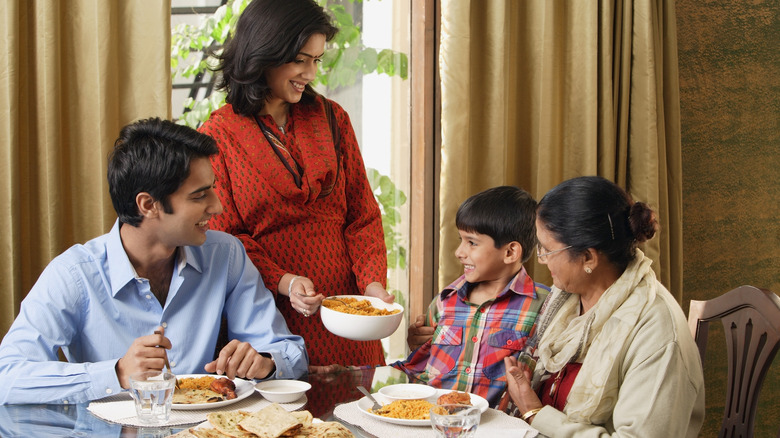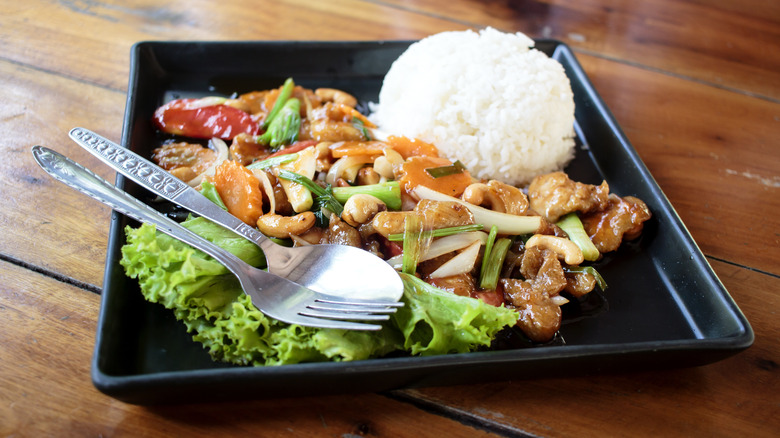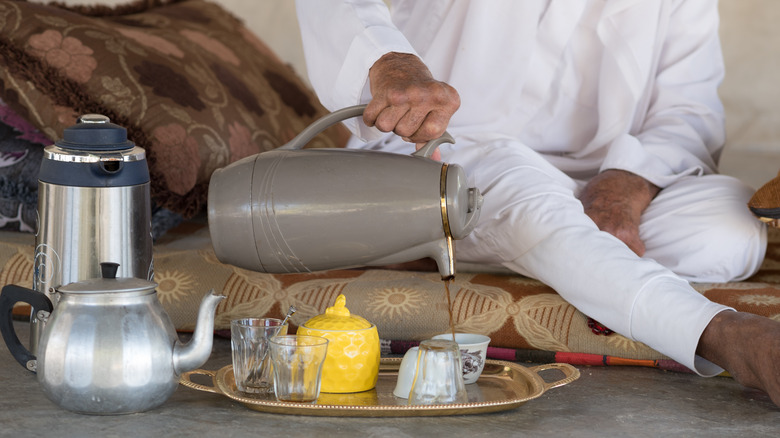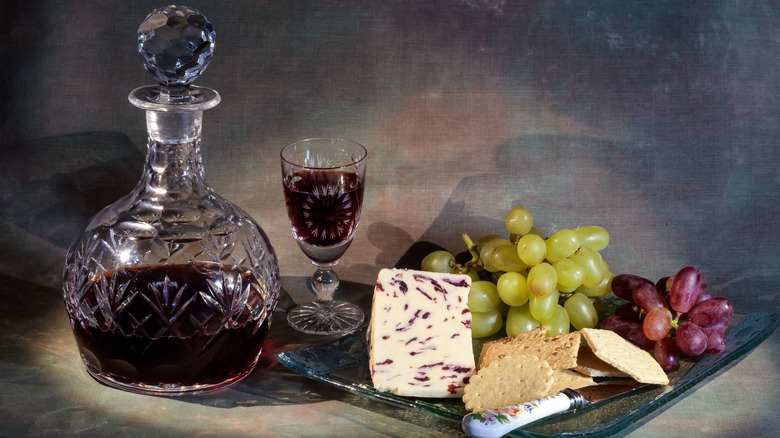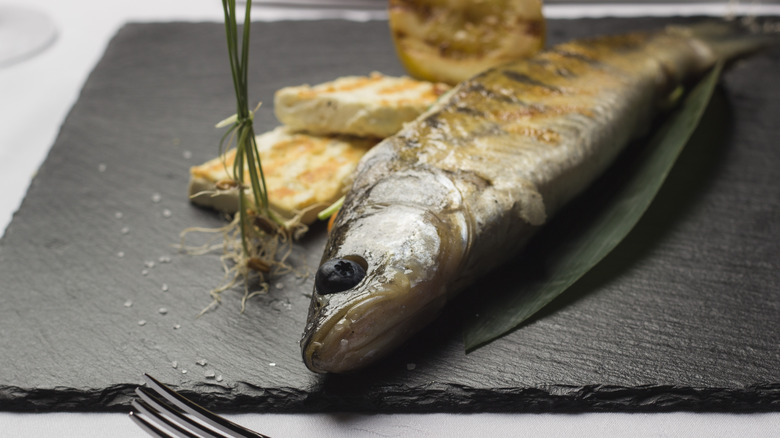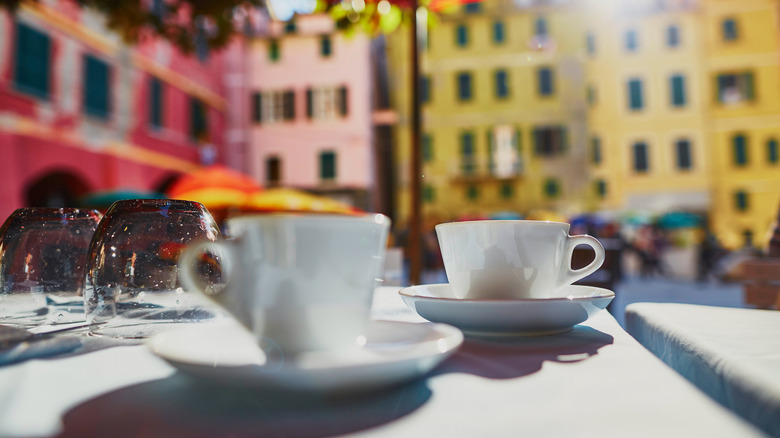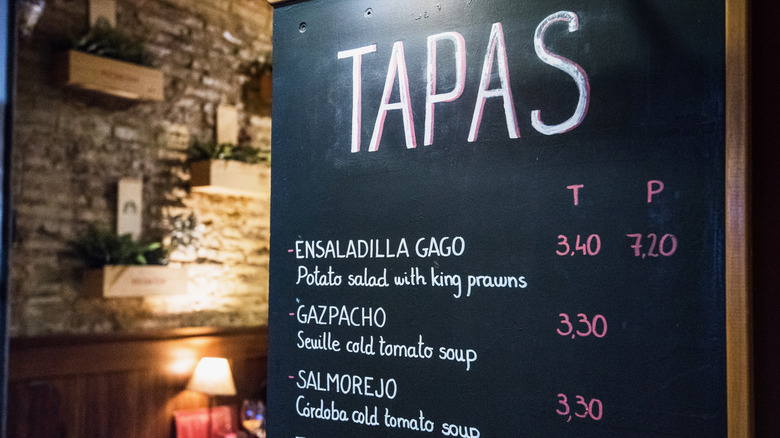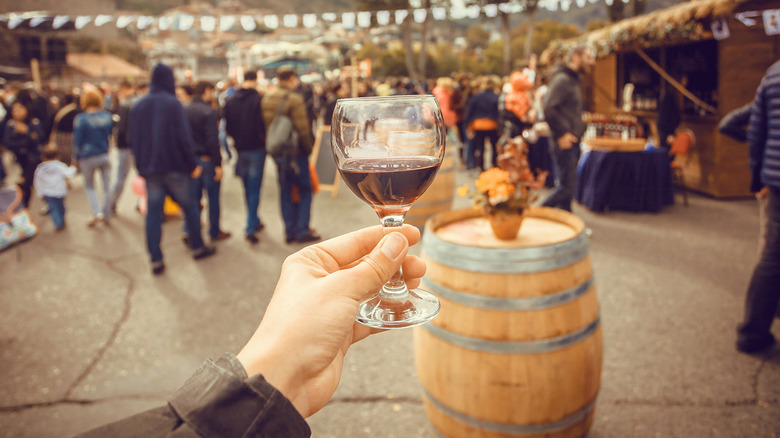Crazy Food Etiquette Rules From Around The World
Anyone who's ever had a great-aunt smacking at their elbows for resting them on the dinner table knows just how important etiquette can be. Our etiquette — and the reasons behind it — are so ingrained in us that we might not think twice about it, but head to any one of a number of countries and you'll find some different and often baffling bits of dining etiquette. Let's look at some of the wildest, weirdest things diners in other countries are doing.
China: Don't finish what you're served
Ever been scolded for not finishing everything that's on your plate? There are all those starving children out there, and it's disrespectful not to finish, right? According to HuffPost, falling back on what Mom and Dad always taught you and finishing off every last crumb is a major faux pas in China.
Cleaning your plate suggests you're still hungry, and it implies your host didn't give you enough food. Needless to say, that's a big insult ... but if you're in India or Japan, leaving even a little bit on your plate is just as bad. There, it implies a disrespect toward the host and the food, and it's seen as wasteful. Just how differently an empty plate is interpreted is the perfect example of why you should read up on etiquette before you travel.
India: Don't say thank you
In many countries, it's considered just good manners to say "thank you" when someone, say, pours you a drink or hands you a delicious dessert. But in India, it can be downright insulting.
Trip Savvy has the reasoning, and it makes sense. If you're in a formal situation, saying "thank you" is perfectly fine. But if you're hanging out with friends and family around a dinner table, thanking them is implying they've gone out of their way to do something special for you. From a cultural point of view, though, those things — like passing dishes or making visitors feel comfortable — are just things that go along with being friends and family.
Deepak Singh wrote an entire piece for The Atlantic on just how hard it was to get used to saying "thank you" in a casual setting when he moved to the U.S., after growing up in a culture where it would come off as sarcastic, inadequate, or as an acknowledgement of something so notable it was a favor that needed to be returned one day. In a casual atmosphere, or among friends? Don't say it, because it implies you view your relationship as more formal than friendly.
Hungary: Don't clink your glasses
Whether you're saying, "Cheers" or "Slainte," chances are good you'll clink your glasses together before taking a drink. You absolutely don't want to do that in Hungary, according to Lost in Budapest. It's not only rude, but it'll likely get you yelled at, particularly by older patrons who see you do it.
The story goes, the clinking of glasses is a politically-charged action. When the Austrian government suppressed a Hungarian uprising in 1848, Austrian leaders celebrated very publicly by toasting the execution of Hungarian rebels. They, of course, clinked their glasses, and doing it is a reminder of that particularly dark chapter in Hungarian history.
Some places say the tradition of not clinking glasses was only supposed to last 150 years, and because the first pledge not to clink glasses was made on January 1, 1850, the tradition should have ended on January 1, 2000. It's still observed, though, so just don't do it.
Spain: Garbage? That goes on the floor
Spain has some incredible food, along with a bizarre way of advertising just how good a restaurant's food is. According to La Tortuga Viajera, anyone looking for a good tapas place should look for the place with the most amount of garbage on the floor. What? Really! That's anything from napkins and pits to discarded food waste, and here's why that's actually a thing. The reasoning went that the better food a place had, the more busy it was, the more busy it was, the more people were in and out the door — which means a ton of garbage building up.
So, if there's garbage on the floor, go ahead and add to it off your own plate. Spanish Sabores adds, though, not all restaurants in Spain follow that line of thinking, so check the floor, then do as the locals do.
Thailand: Using your fork is tricky business
Thai food is so delicious you might be tempted to head there just for the authentic eating, and you probably already know rice is a key part of the cuisine. If rice is on the table, though, that makes etiquette a bit tricky.
According to Trip Savvy, you'll get chopsticks for noodle dishes and a fork and spoon for everything else. The fork goes in your left hand and the spoon in the right, but you're not going to use that fork for eating. It's strictly for getting food from the plate to the spoon, or cutting chunks into smaller pieces. The fork absolutely doesn't go in your mouth. Also, sticky rice is eaten with your fingers, and don't forget to take lots of small portions instead of a few large ones.
Jordan: Coffee etiquette is complicated
Coffee in America is a pretty standard way to start the day, and you probably make it before you're even fully awake in the morning. But in the Bedouin cultures of Jordan, it's a super-special affair with a completely different set of rules that Simone from Simone's Kitchen experienced firsthand.
She says it's an important part of their culture, and sharing a cup of coffee is the backdrop against which wars are settled, marriages are arranged, and disputes are negotiated. Men and women are typically separated, and each group waits and watches while the host makes the coffee then tries it first, to make sure it's suitable for serving. Then, each guest gets a tiny bit in a tiny cup, and it's not unusual for cups to be passed back to be refilled and handed off to the next person.
People are served from right to left, and you're allowed a max of three cups. Wadi Run Nomads says those cups are for the soul, the sword, and because of guest right. You can stop any time by shaking your cup at your host, but they also say you'd better be ready to drink at least one cup — refusing is incredibly rude.
Russia: Drinking comes with a lot of rules
It's no secret that Russians love their vodka, and they love the traditions that have grown up around it, too. Etiquette says you'd better be prepared to drink up throughout the work day, and according to PRI, visitors often say it's easier to just go along with it than endure the scorn that comes with declining a drink — an action that's seen as rude.
Modern Drunkard says it's also a major insult not to offer someone a drink if you're hosting a gathering, and if you're late, you'd better be prepared to accept a full glass of whatever's going around to catch up. Don't refuse one last drink before you go, don't open a bottle you don't plan on finishing, don't turn down food offered alongside your drink, and don't contaminate your vodka with anything else. Easy enough... right?
Britain: Pass the port to the left
According to Taylor's, a British Port maker founded in 1625, British tradition dictates a decanter of port should be passed around the table in a clockwise direction. No one really knows why, but you're likely to hear reasons like keeping your right hand free to grab a sword, or simply because "port" means the left side of a ship, and it's long been the drink of choice for Royal Navy toasts.
What if someone next to you gets distracted, and doesn't hand you the port? Etiquette says you don't ask for it directly, instead, you ask, "Do you know the Bishop of Norwich?" People in the know will immediately know it's a reference to pass the port, and The Telegraph says if someone doesn't get it, the accepted follow-up is, "He's a terribly good chap, but he always forgets to pass the port." Taylor's says that likely started with Henry Bathurst, who served as bishop until 1837. In his advanced age, his failing eyesight made him likely to miss the fact the port had stopped at him, and occasionally, he was known to nod off during a meal, too. This little bit of etiquette developed as a polite way to remind him there were others waiting along the table.
China: Don't turn a fish over
There's a couple very neat traditions followed in China when fish are served. According to The World of Chinese, a fish — or other animal, like duck — that's served whole should face the oldest person at the table as a sign of respect. Positioning it any other way is a major insult.
The other thing that just isn't done is turning the fish over. It might seem like the logical way to get to the meat on the other side, but the act is linked to the idea of turning bones, which essentially means to become a traitor, or turn your back on someone you're supposed to be loyal to. It's also said turning a fish over is to invite disaster down onto the fishing boats, and it could cause them to capsize. According to what one source told researchers at the USC Digital Folklore Archives, the meaning has expanded in recent times. It's just bad luck to flip the fish over, so while the etiquette remains the same, the meaning has changed a bit.
Thailand: You won't be ordering if you're out with a group
Even if you've been ordering for yourself for as long as you can remember, you won't be doing that in Thailand. According to Trip Savvy, it's the responsibility of the eldest women at the table to order for the entire group, and you shouldn't speak up with suggestions — even if that suggestion is dietary restrictions you have. There's going to be plenty of options once the dishes arrive, so it's not a big deal to turn down something for any particular reason.
Italy: Coffee etiquette depends on the clock
You know coffee is taken very seriously in Italy, and there are some rules that go with ordering — and drinking — it. The big one? Don't order milk in your coffee after 11 a.m., and that rule applies to every kind of coffee. No local would ever order a cappuccino in the afternoon or evening, and that's because of the widespread, long-standing belief that milk will interfere with your digestion. According to Italy Explained, you can certainly order a cappuccino at any time of the day, and while most places in larger will bring it to you, it's not unheard of that your request could be outright refused. Then, you'll just be ashamed, and no one wants that. When in Rome!
The Telegraph has a few other etiquette tidbits that might sound strange to non-Italians. You don't need to use the word "espresso," because that's pretty much the standard. Don't sit around and drink your coffee, just down it and go. And don't order something complicated — it's just rude, and it takes away from the brilliance of Italian coffee, best enjoyed in the same way it has been for generations.
Spain: Getting a table can be tricky
Getting a table in some Spanish restaurants can be much, much harder than you expect, and there's some strange dining etiquette you'll have to partake in if you ever want to grab a seat.
According to Spanish Sabores, a nice, sit-down restaurant will often have wait staff ready to seat you as soon as a table opens up. But in a tapas bar, patio bar, or other crowded, casual venue, there's no wait list, no reservations, and the wait staff has other things to do. You're on your own, and that can mean lurking near tables filled with diners who look like they're finishing up their meal. As soon as they get up to leave, it's completely fine to swoop in and grab the table for yourself, and rest assured, there are other groups waiting to do exactly that. Be quick if you want a seat.
Georgia: Don't sip your wine
Georgia takes their wine very, very seriously, and that's not surprising. In 2011, National Geographic reported on the discovery of the world's oldest winery in nearby Armenia, seeming to confirm the region was the birthplace of wine. They've been making it since around 4100 BC, so when it comes to traditions they've had a long time to perfect them.
Wine is at the very heart of Georgian culture, and Real Food Traveler found that out first-hand after wandering into a little Georgian tavern and a Supra. Georgian culture means a lot of wine-drinking, and Supras are massive events — either planned or spontaneous — that are made up of plates and plates of food, toast after toast, and glasses and glasses of wine. Then more glasses of wine, and a few more for good measure. Fortunately, the glasses are fairly small, because etiquette dictates the entire glass is to be drank at once after each toast, and Luxe Beat says it's even considered rude to just sip your wine. Down it in one go, and be ready for the next.
Splitting the bill
Etiquette for splitting a bill varies greatly by country, says Matador. In China, the Philippines, and India, it's acceptable to split the bill, but if the group includes an older person or couple, they may regard paying the entire thing as their honor. The same general rule applies in Australia, but there, it's usually the one who makes the most money who offers to pay for the group. You'll pay for your own meal in Germany, Canada, Iceland, New Zealand, Norway, and in Italy ... most of the time. If you're in Italy and it's your birthday, you can expect to pay for the whole thing.
In some countries, like Mexico, Thailand, Spain, Scotland, Guatemala, Colombia, and Egypt, it's pretty usual (but not guaranteed) that the person who did the inviting will foot the bill. In Guatemala, it's seen as presumptuous to assume the person you're inviting out to dinner has the spare cash for a fancy meal, so you pay their way and avoid any potential discomfort. In Ireland and Lebanon, though, be prepared to put up a fight to decide who gets to pay the bill — and don't be surprised if people resort to sneaky tactics to pay.


